
Aerox
Ask a doctor about a prescription for Aerox

How to use Aerox
PATIENT INFORMATION LEAFLET
Information leaflet included in the packaging: patient information
Aerox, (200 micrograms + 6 micrograms)/dose, inhalation aerosol, solution
Beclometasone dipropionate + Formoterol fumarate dihydrate
Read the leaflet carefully before using the medicine, as it contains important information for the patient.
- Keep this leaflet, you may need to read it again.
- In case of any doubts, consult a doctor, pharmacist, or nurse.
- This medicine has been prescribed specifically for this person. Do not pass it on to others. The medicine may harm another person, even if their symptoms are the same.
- If the patient experiences any side effects, including any not listed in this leaflet, they should tell their doctor, pharmacist, or nurse. See section 4.
Table of contents of the leaflet:
- 1. What is Aerox and what is it used for
- 2. Important information before using Aerox
- 3. How to use Aerox
- 4. Possible side effects
- 5. How to store Aerox
- 6. Contents of the pack and other information
1. What is Aerox and what is it used for
Aerox is a solution in an inhalation aerosol, containing two active substances that are inhaled directly into the lungs through the mouthpiece of the inhaler.
The medicine contains two active substances: beclometasone dipropionate and formoterol fumarate dihydrate.
Beclometasone dipropionate belongs to a group of medicines called corticosteroids, which have an anti-inflammatory effect by reducing swelling and irritation in the lungs.
Formoterol fumarate dihydrate belongs to a group of long-acting bronchodilators, which relax the muscles in the airways and make breathing easier.
Together, these two active substances make breathing easier by relieving symptoms such as:
shortness of breath, wheezing, and cough in patients with asthma, and also help prevent asthma symptoms.
Aerox is intended for the treatment of asthma in adults.
Aerox is used in patients who:
have asthma symptoms that are not adequately controlled with inhaled corticosteroids and a short-acting bronchodilator used as needed, or
have achieved adequate control of asthma symptoms with both inhaled corticosteroids and long-acting bronchodilators.
2. Important information before using Aerox
When not to use Aerox:
- if the patient is allergic to beclometasone dipropionate, formoterol fumarate dihydrate, or any of the other ingredients of this medicine (listed in section 6).
Warnings and precautions
Before starting treatment with Aerox, the patient should discuss the following with their doctor, pharmacist, or nurse:
- If the patient has heart problems, such as angina (chest pain), heart failure, high blood pressure, or any other heart problems.
- If the patient has high blood pressure or an aneurysm (abnormal dilation of a blood vessel wall).
- If the patient has irregular heart rhythms, such as rapid or irregular heartbeat, rapid pulse, or palpitations, or any information about abnormal heart rhythm.
- If the patient has an overactive thyroid gland.
- If the patient has low potassium levels in the blood.
- If the patient has liver or kidney disease.
- If the patient has diabetes (inhalation of high doses of formoterol may increase blood glucose levels. Before starting treatment with this medicine, and from time to time during treatment, additional blood tests may be necessary to check blood glucose levels).
- If the patient has a pheochromocytoma (a tumor of the adrenal gland).
- If the patient is scheduled for general anesthesia. Depending on the type of anesthesia, it may be necessary to discontinue Aerox at least 12 hours before anesthesia.
- If the patient is being treated or has been treated for tuberculosis or if the patient has a viral or fungal infection in the chest.
- If the patient needs to avoid consuming alcohol for any reason.
Before using Aerox, the patient should always inform their doctor if any of the above warnings apply to them.
Before using an inhaled medicine, the patient should consult a doctor, pharmacist, or nurse if they have any current or past health problems or allergies, or if they are unsure whether Aerox can be used.
The doctor may from time to time order a blood test to check potassium levels, especially in patients with severe
asthma.Like other bronchodilators, Aerox may cause a sudden decrease in blood potassium levels (hypokalemia). This is related to low oxygen levels in the blood, caused by taking other medicines at the same time as Aerox, which may increase the decrease in potassium levels in the blood.
If the patient is taking high doses of inhaled corticosteroids for a long time, they may be more likely to need corticosteroids during stressful periods. Stressful situations may include: hospitalization after an accident, severe injury, or awaiting surgery. In such situations, the doctor will decide whether to increase the dose of corticosteroids or prescribe other steroids in the form of tablets or injections.
If hospitalization is necessary, the patient should remember to take all their medicines and inhalers, including Aerox, as well as over-the-counter medicines, if possible, in their original packaging.
If the patient experiences blurred vision or other vision disturbances, they should contact their doctor. Children and adolescents
Aerox should not be used in children and adolescents under 18 years of age.
Aerox and other medicines:
- The patient should tell their doctor about all medicines they are currently taking or have recently taken, as well as any medicines they plan to take, including those available without a prescription. This is necessary because Aerox may affect the action of some other medicines. Similarly, some medicines may affect the action of Aerox.
In particular, the patient should tell their doctor, pharmacist, or nurse if they are taking the following medicines:
- Some medicines may enhance the effect of Aerox, and the doctor may want to monitor the patient's condition closely when taking such medicines (including some medicines used to treat HIV infection: ritonavir, cobicistat).
- Beta-blockers. Beta-blockers are medicines used to treat many diseases, including heart disease, high blood pressure, and glaucoma (increased pressure in the eye). If beta-blockers need to be administered (including eye drops), the effect of formoterol may be reduced or formoterol may not work at all.
- Medicines that stimulate beta-adrenergic receptors (medicines that work in the same way as formoterol) may enhance the effect of formoterol.
- Medicines used to treat irregular heart rhythms (quinidine, disopyramide, procainamide).
- Medicines used to treat allergies (antihistamines).
- Medicines used to treat symptoms of depression or mental disorders, such as monoamine oxidase inhibitors (e.g., phenelzine and isocarboxazid), tricyclic antidepressants (e.g., amitriptyline and imipramine), phenothiazines.
- Medicines used to treat Parkinson's disease (L-dopa).
- Medicines used to treat hypothyroidism (L-thyroxine).
- Medicines containing oxytocin (which induce uterine contractions).
- Medicines used to treat mental disorders, such as monoamine oxidase inhibitors (MAOIs) or medicines with similar properties, such as furazolidone and procarbazine.
- Medicines used to treat heart disease (digoxin).
- Other medicines used to treat asthma (theophylline, aminophylline, or steroids).
- Diuretics.
The patient should also inform their doctor if they are scheduled to undergo general anesthesia for surgery or a dental procedure.
Pregnancy, breastfeeding, and fertility
There are no clinical data on the use of Aerox during pregnancy.
Aerox should not be used if the patient is pregnant, thinks they may be pregnant, or plans to have a child, or if the patient is breastfeeding, unless the doctor decides otherwise.
Driving and using machines
It is unlikely that Aerox will affect the ability to drive or use machines.
Aerox contains alcohol
Aerox contains 9 mg of alcohol (ethanol) per actuation, which is equivalent to 0.25 mg/kg body weight per dose, when two actuations are used. The amount of alcohol in two actuations of this medicine is equivalent to less than 1 ml of beer or wine. The small amount of alcohol in this medicine is unlikely to have noticeable effects.
3. How to use Aerox
This medicine should always be used as directed by the doctor or pharmacist. In case of doubts, the patient should consult their doctor or pharmacist.
The doctor will regularly check that the patient is taking the optimal dose of Aerox.
The doctor will determine the smallest dose that provides the best control of asthma symptoms.
Dosage:
Adults and the elderly:
The recommended dose is two actuations, twice daily.
The maximum daily dose is 4 actuations.
Important: Always carry a quick-acting inhaled reliever medicine to treat asthma symptoms or a sudden asthma attack.
Special patient groups:
No dose adjustment is necessary in the elderly. There is no information on the use of Aerox in patients with liver or kidney impairment.
Use in children and adolescents under 18 years of age:
This medicine MUST NOTbe used in children and adolescents under 18 years of age.
The dose of beclometasone dipropionate in Aerox, which is effective in treating asthma, may be lower than the dose in other inhaled medicines containing this substance. If the patient has previously used another inhaled medicine containing beclometasone
dipropionate, the doctor will prescribe the appropriate dose of Aerox.
Do not exceed the dose.
If the patient feels that the effect of the medicine is insufficient, they should always consult their doctor before increasing the dose.
In case of worsening asthma symptoms:
In case of worsening of the disease or difficulty in controlling symptoms (e.g., when the patient needs to use another inhaled reliever medicine more frequently) or when the inhaled reliever medicine does not relieve symptoms, the patient should immediately inform their doctor. This may indicate worsening of asthma, and the doctor may decide to change the dose of Aerox or use another treatment.
Method of administration:
Aerox is intended for inhalation use.
This medicine is in a pressurized container, in a plastic casing with a mouthpiece. At the back of the inhaler for 120 doses, there is a dose counter, and for 180 doses, there is a dose indicator, which shows how many doses of medicine are left.
For the 120-dose size, each time the inhaler is pressed, a dose of medicine is released, and the dose counter will show one dose less. The patient should be careful not to drop the inhaler, as this may cause the dose counter to decrement.
For the 180-dose size, the dose indicator will show the approximate number of actuations left in the container. The dose indicator window displays the number of actuations left in the inhaler in increments of twenty (e.g., 180, 120, 100, 80, etc.). When 20 doses are left, and the number 20 appears on the display, it means that the container is approaching the end of its service life.
After 180 actuations, the number 0 will appear on the display.
The dose indicator will stop moving at "0".
Testing the inhaler
Before first use, or if the inhaler has not been used for 14 days or more, the patient should perform an inhaler test to ensure it is working properly.
- Remove the protective cap from the mouthpiece.
- Hold the container upright with the mouthpiece pointing downwards.
- Point the mouthpiece away from the patient and press the container firmly to release one actuation.
- If the inhaler has not been used for 14 days or more, press the container firmly to release one actuation.
- For the 120-dose size, check the dose counter. If the inhaler is being tested for the first time, the dose counter should show 120.
- For the 180-dose size, check the dose indicator. If the inhaler is being tested for the first time, the dose indicator should show 180.
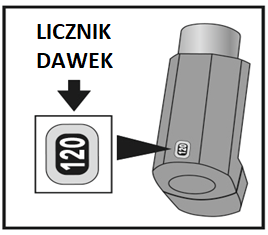
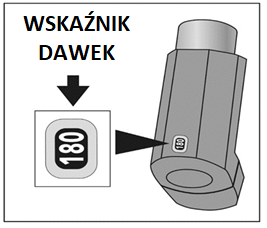
How to use the inhaler
If possible, the patient should stand or sit upright while inhaling.
Before inhaling, the patient should check the dose counter or dose indicator, which shows how many doses are left. If the dose counter or dose indicator shows "0", there are no doses left – the inhaler should be discarded and a new one purchased.
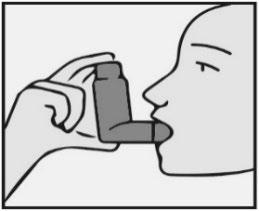
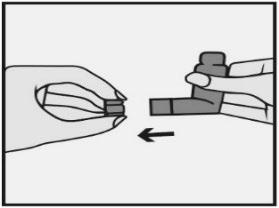
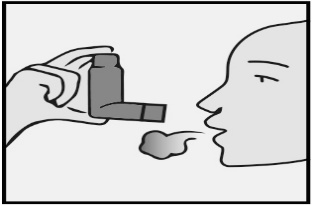
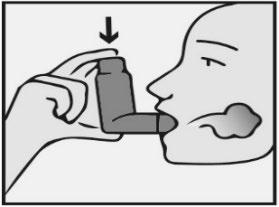
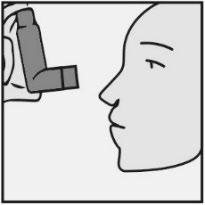
- 1) 2) 3) 4) 5)
- 1. Remove the protective cap from the mouthpiece and check that the mouthpiece is clean and free from dust or other contaminants (Figure 1).
- 2. Exhale slowly and as deeply as possible (Figure 2).
- 3. Hold the container upright, with the base pointing upwards, and then place the mouthpiece between the lips. Do not bite the mouthpiece (Figure 3).
- 4. Take a slow and deep breath in through the mouth. Just after starting to breathe in, press the top of the inhaler firmlyto release one actuation of the medicine. Patients with weak grip will find it easier to hold the inhaler with both hands: they should then place both index fingers on the top of the inhaler and both thumbs on the base (Figure 4).
- 5. Hold the breath for as long as possible, then remove the inhaler from the mouth and breathe out slowly. Do not breathe out into the inhaler (Figure 5).
If a second dose is to be taken, the patient should hold the inhaler upright for about half a minute, then repeat the steps described in points 2 to 5.
Important:The steps described in points 2 to 5 should not be performed too quickly.
After use, the patient should replace the protective cap and check the dose counter for the 120-dose size and the dose indicator for the 180-dose size.
To reduce the risk of fungal infections of the mouth and throat, the patient should rinse their mouth or throat with water or brush their teeth after each inhalation.
When to replace the inhaler
If the dose counter or dose indicator shows 20, the patient should have a new inhaler ready. The patient should stop using the inhaler if the dose counter shows 0, as the medicine left in the container may not provide a full dose, and they should start using a new inhaler.
If a "mist" appears over the top opening of the mouthpiece or from the side of the mouth, it means that Aerox is not reaching the lungs as it should. The patient should take another dose, following the instructions, starting again from point 2.
If the patient feels that the effect of Aerox is too strong or too weak, they should consult their doctor or pharmacist.
In case of difficulties in handling the inhaler during inhalation, the patient can use a spacer (AeroChamber Plus). The patient should ask their doctor, pharmacist, or nurse about this device.
It is essential to read the leaflet that comes with the AeroChamber Plus spacer and follow the instructions for use and cleaning.
Cleaning
The inhaler should be cleaned once a week.
During cleaning, the patient should not remove the container from the plastic casing, and they should not use water or other liquids to clean the inhaler.
Cleaning the inhaler:
- 1. Remove the protective cap from the mouthpiece by pulling it straight off the inhaler.
- 2. Wipe the mouthpiece and dose counter or dose indicator from the inside and outside with a dry cloth or tissue.
- 3. Replace the protective cap.
Using a higher dose of Aerox than recommended:
- using a higher dose of formoterol than recommended may cause the following symptoms: nausea, vomiting, rapid heartbeat, palpitations, irregular heartbeat, changes in the electrocardiogram (ECG), headache, tremors, drowsiness, excessive acid production in the blood, decreased potassium levels in the blood, increased glucose levels in the blood. The doctor may order a blood test to check potassium and glucose levels in the blood.
- using too high a dose of beclometasone dipropionate may cause short-term adrenal gland problems, which resolve on their own within a few days. The doctor may order a blood test to check cortisol levels in the blood.
If the patient experiences any of these symptoms, they should inform their doctor.
Missing a dose of Aerox:
The patient should take the missed dose as soon as possible. If it is almost time for the next dose, they should not take the missed dose, but take the next dose at the usual planned time. Do not take a double dose to make up for a missed dose.
Stopping treatment with Aerox:
Even if the patient feels better, they should not stop using Aerox or reduce the dose without consulting their doctor. It is essential to take the medicine regularly, even when symptoms have disappeared.
In case of any further doubts about using this medicine, the patient should consult their doctor or pharmacist.
4. Possible side effects
Like all medicines, Aerox can cause side effects, although not everybody gets them.
As with other inhaled medicines, there is a risk of worsening shortness of breath and wheezing immediately after using Aerox, known as paradoxical bronchospasm. In this case, the patient should STOP using Aerox immediatelyand use a quick-acting inhaled bronchodilator to relieve shortness of breath and wheezing. The patient should contact their doctor immediately.
The patient should inform their doctor immediatelyif they experience any allergic reactions, such as:
skin allergies, itching, skin rash, skin redness, swelling of the skin or mucous membranes, especially of the eyes, face, lips, and throat.
Other possible side effects are listed below, depending on their frequency.
- Fungal infections (of the mouth and throat),
- headache,
- hoarseness,
- sore throat.
Uncommon(occurring in less than 1 in 100 patients):
- palpitations, irregular heartbeat, and arrhythmias,
- changes in the electrocardiogram (ECG),
- increased blood pressure,
- flu-like symptoms,
- sinusitis,
- nasal congestion,
- ear infection,
- throat irritation,
- cough and cough with expectoration,
- asthma attack,
- vaginal fungal infections,
- nausea,
- taste disturbances,
- lip burning,
- dry mouth,
- difficulty swallowing,
- indigestion,
- upset stomach,
- diarrhea,
- muscle pain and muscle cramps,
- redness of the face and throat,
- increased blood flow to some tissues,
- increased sweating,
- tremors,
- restlessness, especially motor restlessness,
- dizziness,
- hives,
- changes in some blood test results: decreased white blood cell count, increased platelet count, decreased potassium levels in the blood, increased glucose levels in the blood, increased insulin, free fatty acids, and ketone bodies in the blood.
The following side effects have also been reported as "uncommon" in patients with chronic obstructive pulmonary disease:
- pneumonia: the patient should inform their doctor if they experience any of the following symptoms: increased production of sputum, change in sputum color, fever, increased cough, increased breathing problems,
- decreased cortisol levels in the blood, caused by the effect of corticosteroids on the adrenal glands,
- irregular heartbeat.
Rare(occurring in less than 1 in 1000 patients):
- feeling of pressure in the chest,
- arrhythmias (caused by premature contraction of the heart chambers),
- decreased blood pressure,
- kidney inflammation,
- skin and mucous membrane swelling, lasting for several days.
Very rare(occurring in less than 1 in 10,000 patients):
- shortness of breath,
- worsening of asthma,
- decreased platelet count,
- swelling of the hands and feet.
Using inhaled corticosteroids in high doses for a long time may cause
systemic effects in very rare cases. These include:
- adrenal gland problems (suppression of adrenal gland function),
- decreased bone density (thinning of the bones),
- delayed growth in children and adolescents,
- increased eye pressure (glaucoma),
- cataracts.
Unknown frequency(frequency cannot be estimated from available data):
- sleep disturbances,
- depression or feeling of sadness,
- nervousness,
- overexcitement or irritability.
These side effects are more likely to occur in children, but the frequency of these side effects is unknown.
- Blurred vision.
Reporting side effects
If the patient experiences any side effects, including any not listed in this leaflet, they should tell their doctor or pharmacist. Side effects can be reported directly to the Department of Drug Safety Monitoring, Office for Registration of Medicinal Products, Medical Devices, and Biocidal Products
Al. Jerozolimskie 181C
02-222 Warsaw
tel.: + 48 22 49 21 301
fax: + 48 22 49 21 309
website: https://smz.ezdrowie.gov.pl
Side effects can also be reported to the marketing authorization holder.
Reporting side effects will help to gather more information on the safety of this medicine.
5. How to store Aerox
Keep the medicine out of the sight and reach of children.
Single pack containing one container of 120 or 180 doses
For the pharmacist:
Store the inhaler in the refrigerator (2°C – 8°C) for a maximum of 18 months.
Write the date of issue of the medicine to the patient on the self-adhesive label on the packaging and attach the label to the inhaler. Ensure that the period between the date of issue of the medicine and the expiry date stated on the packaging is at least 3 months.
For the patient:
Do not store the inhaler at temperatures above 25°C.
Do not use Aerox after 3 months from first use and after the expiry date stated on the carton or label. The expiry date refers to the last day of the month.
Double or triple packs containing two or three containers of 120 doses
Before first use: store the inhalers in the refrigerator (2°C – 8°C).
After first use: do not store the inhalers at temperatures above 25°C. Store for a maximum of 3 months.
When starting to use each inhaler, write the date of first use on the self-adhesive label on the packaging and attach the label to the inhaler. Do not use this medicine after 3 months from first use and after the expiry date stated on the carton or label.
The expiry date refers to the last day of the month.
Do not freeze.
If the inhaler has been cooled, before using the medicine, warm it in the hands for a few minutes.
Never use other methods to heat the container.
Important:The container contains a pressurized liquid. Do not expose to temperatures above 50°C. Do not pierce the container.
Medicines should not be disposed of via wastewater or household waste. The patient should ask their pharmacist how to dispose of medicines that are no longer needed. This will help protect the environment.
6. Contents of the pack and other information
What Aerox contains:
The active substances of the medicine are: beclometasone dipropionate and formoterol fumarate dihydrate.
One actuation from the inhaler contains 200 micrograms of beclometasone dipropionate and 6 micrograms of formoterol fumarate dihydrate.
This corresponds to a delivered dose from the mouthpiece of 177.7 micrograms of beclometasone dipropionate and 5.1 micrograms of formoterol fumarate dihydrate.
The other ingredients are: norflurane (HFA 134a), anhydrous ethanol, concentrated hydrochloric acid.
This medicine contains fluorinated greenhouse gases.
Each 120-dose inhaler contains 10.35 g of HFA 134a, which corresponds to 0.015 tons of CO2 equivalent (global warming potential GWP = 1,430).
Each 180-dose inhaler contains 14.24 g of HFA 134a, which corresponds to 0.020 tons of CO2 equivalent (global warming potential GWP = 1,430).
What Aerox looks like and contents of the pack:
Aerox is available as a solution for inhalation, in an aluminum container with a metering valve, fitted into a white plastic actuator, which has a dose counter (120 doses) or a dose indicator (180 doses) with a green plastic protective cap.
Each pack contains:
1 pressurized container providing 120 doses (actuations) or
2 pressurized containers, each providing 120 doses or
3 pressurized containers, each providing 120 doses or
1 pressurized container providing 180 doses
Not all pack sizes may be marketed.
Marketing authorization holder
Adamed Pharma S.A.
Pieńków, ul. M. Adamkiewicza 6A
05-152 Czosnów
Tel: +48 22 732 77 00
Manufacturer
Genetic S.p.A.
Contrada Canfora
84084 Fisciano
Italy
This medicine is authorized in the Member States of the European Economic Area under the following names:
| Austria | Beclometason/Formoterol Genetic 200 mikrogramm /6 mikrogramm/Sprühstoß Druckgasinhalation, Lösung |
Date of last revision of the leaflet:
| Belgium | Beclometasone/Formoterol Genetic 200/6 microgram/dosis aërosol, oplossing |
| Luxembourg | Beclometasone/Formoterol Genetic 200 microgrammes /6 microgrammes/dose, solution pour inhalation en flacon pressurisé |
| Germany | Beclometason/Formoterol Genetic 200 Mikrogramm/6 Mikrogramm pro Inhalation Druckgasinhalation, Lösung |
| Netherlands | Beclometason/Formoterol Allgen 200 microgram /6 microgram/dosis, aërosol, oplossing |
| Estonia | Beclametasone/Formoterol Genetic |
| France | BÉCLOMÉTASONE/FORMOTÉROL BIOGARAN 200 microgrammes /6 microgrammes/dose, solution pour inhalation en flacon pressurisé |
| Lithuania | Beclometasone/Formoterol Genetic 200 mikrogramų /6 mikrogramai spūsnyje suslėgtasis įkvepiamasis tirpalas |
| Latvia | Beclometasone/Formoterol Genetic 200 mikrogrami/6 mikrogrami izsmidzinājumā aerosols inhalācijām, zem spiediena, šķīdums |
| Romania | Beclometazonă/Formoterol Genetic 200 micrograme /6 micrograme pe doză, soluţie de inhalat presurizată |
| Slovakia | Beklometasón-formoterol Genetic 200 mikrogramov /6 mikrogramov/dávka |
| Italy | Beclometasone e Formoterolo Genetic |
| Portugal | Beclometasona Formoterol Genetic 200 mcg/6 mcg Solução pressurizada para inalação |
| Spain | Beclometasona Formoterol Genetic 200 microgramos/6 microgramos/pulsación Solución para inhalación en envase a presión |
| Greece | Breair |
| Poland | Aerox |
| Hungary | Beclometasone formoterol Genetic 200 mcg /6 mcg túlnyomásos inhalációs oldat |
| Bulgaria | Беклометазон формотерол Genetic 200 микрограма /6 микрограма/доза, разтвор под налягане за инхалация |
| Czech Republic | Beklometason/Formoterol Genetic |
| Slovenia | Beklometazon/formoterol Genetic 200 mikrogramov /6 mikrogramov na potisk inhalacijska raztopina pod tlakom |
| Ireland | Beclometasone/formoterol 200 microgram/60 microgram per actuation pressurised inhalation solution |
| Croatia | Beklometazondipropionat/formoterolfumarat dihidrat Genetic 200 mikrograma /6 mikrograma po potisku, stlačeni inhalat, otopina |
| Malta | Beclometasone formoterol Genetic 200 microgram/6 microgram per actuation pressurized inhalation solution |
| Cyprus | Beclometasone formoterol Genetic 200 microgram/6 microgram per actuation pressurized inhalation solution |
- Country of registration
- Active substance
- Prescription requiredYes
- ImporterGenetic S.p.A
- This information is for reference only and does not constitute medical advice. Always consult a licensed doctor before taking any medication. Oladoctor is not responsible for medical decisions based on this content.
- Alternatives to AeroxDosage form: Aerosol, (100 mcg + 6 mcg)/measured doseActive substance: formoterol and beclometasonePrescription requiredDosage form: Aerosol, (100 mcg + 6 mcg)/measured doseActive substance: formoterol and beclometasonePrescription not requiredDosage form: Aerosol, (200 mcg + 6 mcg)/doseActive substance: formoterol and beclometasonePrescription not required
Alternatives to Aerox in other countries
The best alternatives with the same active ingredient and therapeutic effect.
Alternative to Aerox in Испания
Alternative to Aerox in Украина
Online doctors for Aerox
Discuss dosage, side effects, interactions, contraindications, and prescription renewal for Aerox – subject to medical assessment and local rules.














